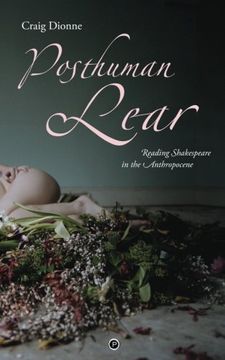Reseña del libro "Posthuman Lear: Reading Shakespeare in the Anthropocene (en Inglés)"
Be sure to fasten your seatbelts while reading Craig Dionne's POSTHUMAN LEAR. In addition to being a wild ride through time and space, hurtling from late antiquity to post-Fukushima-radiated Japan by way of Shakespeare's motley crew of castaways on a storm-battered heath, the book also offers a reparative salve for our troubled anthropocene. As long as we speak what we feel, and reversing Edgar's famous line, even what we *ought* to say, with the shards and broken fragments of borrowed proverbial speech, we will at least have shelter with each other and with a newly denuded world, and in a consoling if partly ruined human language, from the coming Winter. Eileen JoyCraig Dionne has written Shakespearean criticism as it should be written: theoretically sophisticated, historically situated, while tied to the present moment, and thoroughly engaging as a piece of writing. Posthuman Lear will change the way you think ... about Lear and about the work we do. Sharon O'DairApproaching King Lear from an eco-materialist perspective, Posthuman Lear examines how the shift in Shakespeare's tragedy from court to stormy heath activates a different sense of language as tool-being - from that of participating in the flourish of aristocratic prodigality and circumstance, to that of survival and pondering one's interdependence with a denuded world. Dionne frames the thematic arc of Shakespeare's tragedy about the fall of a king as a tableaux of our post-sustainable condition. For Dionne, Lear's progress on the heath works as a parable of flat ontology.At the center of Dionne's analysis of rhetoric and prodigality in the tragedy is the argument that adages and proverbs, working as embodied forms of speech, offer insight into a nonhuman, fragmentary mode of consciousness. The Renaissance fascination with memory and proverbs provides an opportunity to reflect on the human as an instance of such enmeshed being where the habit of articulating memorized patterns of speech works on a somatic level. Dionne theorizes how mnemonic memory functions as a potentially empowering mode of consciousness inherited by our evolutionary history as a species, revealing how our minds work as imprinted machines to recall past prohibitions and useful affective scripts to aid in our interaction with the environment. The proverb is that linguistic inscription that defines the equivalent of human-animal imprinting, where the past is etched upon collective memory within 'adagential' being that lives on through the generations as autonomic cues for survival.Dionne's reimagining of this tragedy is important in the way it places Shakespeare's central existential questions - the meaning of familial love, commitments to friends, our place in a secular world - in a new relation to the main question of surviving within fixed environmental limits. Along the way, Dionne reflects on the larger theoretical implications of recycling the old historicism of early modern culture to speak to an eco-materialism, and why the modernist textual aesthetics of the self-distancing text seems inadequate when considering the uncertainty and trauma that underscores life in a post-sustainable culture. Dionne's final appeal is to "repurpose" our fatalism in the face of ecological disaster.

